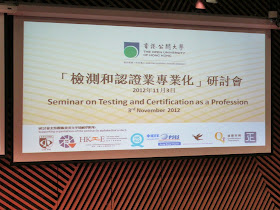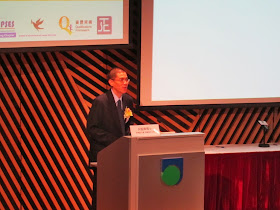In the beginning, Prof. John CY Leong (President, OUHK) gave an opening speech. He mentioned the cooperation among government, industry and academic to enhance the Test and Certification Professional development.
Then the Memorandum of Understanding (MoU) signing ceremony was performed. The MoU between OUHK and Hong Kong Association for Testing, Inspection and Certification (HKTIC) was signed for enhancing the cooperation between industry and academic.
OUHK School of Science & Technology Honorary Professor Appointment Ceremony was started and Prof. Richard Fung (Chief Executive, HKSTC) was awarded this honour.
Prof. Richard Fung gave us award speech and hoped that he could contribute his knowledge and China business network, as well as, advance equipment with OUHK to enhance the development of Testing, Inspection and Certification (TIC) industry.
Souvenirs presentation and group photo
The first speaker was Mr K L Tsang (Chairperson of Certification Board, Professional Certification Scheme for Testing Personnel, Hong Kong Association for Testing, Inspection and Certification (HKTIC)) and his presentation topic named "Strengthening the Development of the Testing and Certification Industry through Professional Certification".
Mr. Tsang pointed out two problems Testing and Certification (T&C) Industry was faced that were "Limited supply of young professionals entering the T&C industry" and "Difficulties to retain young professionals within the industry". It could be caused by "Lack of visible recognition of professional status". Then he introduced HKTIC Professional Recognition Scheme for Testing Personnel as one of solutions which was launched on 28th Sep 2011. The 1st batch of the successful candidates qualified for Certified Testing Professional (CTP) was 183 and Certified Testing Technician (CTT) was 102.
(Similarly, HKSQ has launched the scheme named "Certified Laboratory Quality Specialist (CLabQS)" since 2009 and details at http://qualityalchemist.blogspot.hk/2011/07/hksq-certified-professional-scheme.html)
Mr. Tsang said the scheme was benefit among client, employee and employer.
The second speaker was Mr Harry Yeung (Chief Operations Officer, HKSTC) and his presentation was "Testing and Certification Industry in Hong Kong".
Mr. Tsang said the scheme was benefit among client, employee and employer.
The second speaker was Mr Harry Yeung (Chief Operations Officer, HKSTC) and his presentation was "Testing and Certification Industry in Hong Kong".
Mr. Harry Yeung used ISO/IEC 17000:2004 (Conformity Assessment - Vocabulary and General Principles) to explained "What is Testing and Certification?".
Testing - Determination of one or more characteristics of an object of conformity assessment, according to a procedure
Inspection - Examination of a product design, product, process or installation and determination of its conformity with specific requirements or, on the basis of professional judegement, with general requirements
Certification - Third-party attestation related to products, processes, systems or persons
He said TIC employed to comply with regulatory requirement, to fulfill contract requirement, to ensure public safety, and to give confidence to consumers and buyers, etc. Then his briefed the history of TIC industry as the diagram below.
Finally, Mr. Yeung said the demand for Testing and Certification was increasing. People became more and more concern of their health and safety, and the environment. In addition, governments were putting up more regulations and imposing more stringent requirements on product safety. So the good career prospects in commercial laboratory was expected.
During the break, we visited some exhibitors included HKCTC, HKAS, HKQF, HKTIC and HKSTC.
Dr John C W Ho (Senior Accreditation Officer, Hong Kong Accreditation Service) was the third speaker and his topic entitled "The Role of Accreditation in Supporting Testing, Inspection and Certification".
Dr. Ho introduced the three types of conformity assessment activities included testing, inspection and certification. Then he briefed the testing industry major coverage such as textile (24%), toys (24%), medical testing (20%), electronic product (14%) and others (18%).
Then Dr. Ho mentioned the development of Hong Kong Accreditation Service (HKAS) and its voluntary schemes included HOKLAS, HKCAS and HKIAS.
Mr David Yu (Senior Manager, Qualifications Framework Secretariat) and Mr Chapman Chan (Convener of SCS Drafting sub-working group (Electrical Testing), ITAC of Testing, Inspection and Certification Industry) are the fourth speaker and their presentation title was "The Development of Competency Standards (SCS) for Testing, Inspection and Certification Industry Professionals". Firstly, Mr. David Yu introduced Hong Kong Qualifications Framework (HKQF).
HKQF is a 7-level hierarchy covering qualification in the academic, vocational and continuing education and training sectors. It aims to foster life long learning through continuous education and training with the objecive of enhancing the competency d ce competitiveness of the local workforce.
Mr. David Yu introduced the Inductry Training Advisory Committees (ITACs) by the Education Bureau and one of their roles to map out the knowledge, skills and outcome standards of an industry (so called Specification of Competency Standards). The SCS development process was showed below.
Mr Chapman Chan explained the part two for SCS Development in the TIC Industry.
The functional Map of TIC industry was designed and mentioned.
1. Laboratory / On-site Testing included "Test Method Development and Validation", "Laboratory / On-site Testing", "Chemical Testing", Electrical and Electronic Testing", "Physical and Mechanical Testing" and "Biological/Microbiological Testing".
2. Inspection included "Inspection Method Develpment", "Inspection Preparation" and "Conducting Inspection".
3. Product / System Certification included "Certification Scheme Development and Management", "Certification Audit Programme Planning", "Conducting Audit" and "Audit Reporting and Issuance of Certification".
4. Data Handling and Result Report included "Equipment Calibration and Maintenance", "Measurement Traceability", "Sample Handling", "Data Collection, Analysis and Interpretation", "Quality Assurance of Test Results" and "Test/Inspection Result Reporting".
5. Quality Management included "Laboratory Quality Management System", "Quality Management for Inspection Service" and "Quality Management System for Certification Service".
6. Operations Management included "Operations Strategy", "HR Management and Training", "Financial Management", "Ethical Management", "Occupational Safety and Health", "Environmental Protection", "Customer Service" and "Business Development".
Mr. Chan also discussed the career pathway for TIC Professionals from Technical Personnel to Supervisory Personnel to Management Personnel. The details of major tasks of each type professions were mentioned as follows:
A) Technical Personnel
1. Carry out testing activities according to international standards and test plan
2. Compile and manipulate test results and quality control data to generate test reports
3. Maintain and calibrate laboratory instruments / equipment and reference stanards and materials
4. Maintain laboratory records and documents
5. Maintain a safe work environment by observing the laboratory safety rules
B) Supervisory Personnel
1. Assist Laboratory Manager to supervise technical staff to carry out
2. Monitor the quality of laboratory / on-site testing activities
3. Monitor occupational safety and health in the workplace
4. Develop test/calibration methods and procedures and formulate method validation protocol
5. Undertake validation and verification of test methods and/or reference materials
6. Review test reports to provide opinions and interpretations
C) Management Personnel
1. Lead and manage a team of supervisory and technical staff to carry out testing activities.
2. Oversee the operations of the operations of the laboratory.
3. Establish and manage the quality management system in the laboratory to ensure compliance with international standards and specifications.
Lastly, Mr Chapman Chan showed the draft SCS document and it expected to be completed in Q2 of 2013.
Dr George H K Lau (Associate Professor & Programme Leader (Testing & Certification), School of Science and Technology, The Open University of Hong Kong) was the last speaker and his topic named "Manpower Development for the Testing and Certification Industry".
Dr. Lau briefed the industry profile and found that 59% of employee in the industry (Total of 15,810 persons engaged in 2010) were professionals and associate professionals. The demand of T&C professionals was existed and their knowledge requirement could be separated into Product-based and Measurand-based knowledge.
Then he said the challenges in T&C industry manpower development were "Attracting young talents" and "Enhancing professionalism for practitioners". In order to solve the challenges, OUHK developed BSc and MSc programmes for testing and certification aspects, as well as, HKCTC and HKQF-ITC-ITAC established to enhance professionals.
Reference:
OUHK: http://www.ouhk.edu.hk/WCM/?FUELAP_TEMPLATENAME=tcSingPage&lang=eng
HKCTC: http://www.hkctc.gov.hk/en/about.html
HKQF-TIC-ITAC: http://www.hkqf.gov.hk/guie/com_ITAClist_TIC.asp
HKSQ Certification Scheme “Certified Laboratory Quality Specialist (CLabQS)”: http://www.hksq.org/cert_hksq_clabqs.htm .
Dr. Lau briefed the industry profile and found that 59% of employee in the industry (Total of 15,810 persons engaged in 2010) were professionals and associate professionals. The demand of T&C professionals was existed and their knowledge requirement could be separated into Product-based and Measurand-based knowledge.
Then he said the challenges in T&C industry manpower development were "Attracting young talents" and "Enhancing professionalism for practitioners". In order to solve the challenges, OUHK developed BSc and MSc programmes for testing and certification aspects, as well as, HKCTC and HKQF-ITC-ITAC established to enhance professionals.
Reference:
OUHK: http://www.ouhk.edu.hk/WCM/?FUELAP_TEMPLATENAME=tcSingPage&lang=eng
HKCTC: http://www.hkctc.gov.hk/en/about.html
HKQF-TIC-ITAC: http://www.hkqf.gov.hk/guie/com_ITAClist_TIC.asp
HKSQ Certification Scheme “Certified Laboratory Quality Specialist (CLabQS)”: http://www.hksq.org/cert_hksq_clabqs.htm .


























沒有留言:
發佈留言